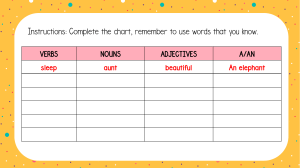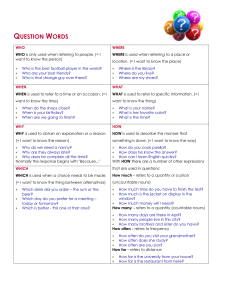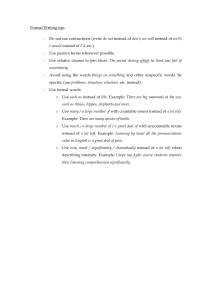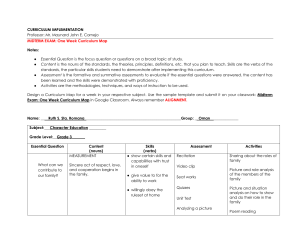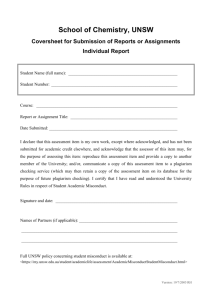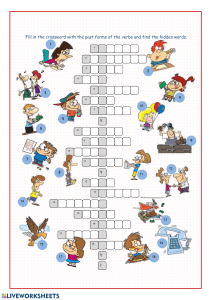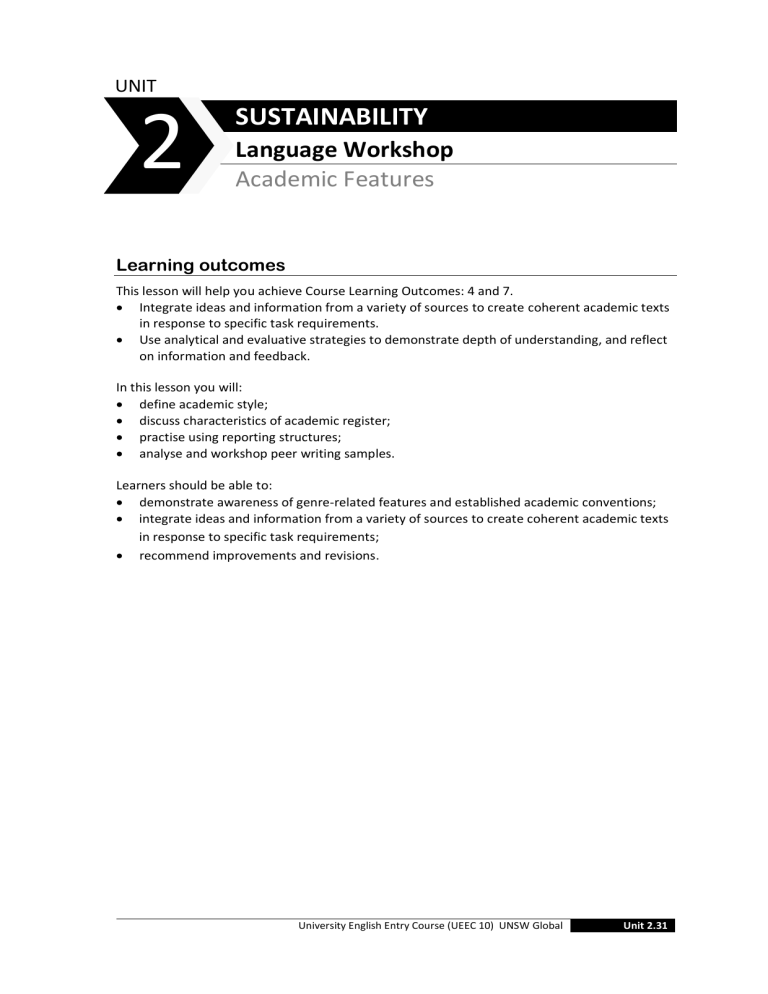
UNIT 2 SUSTAINABILITY Language Workshop Academic Features Learning outcomes This lesson will help you achieve Course Learning Outcomes: 4 and 7. • Integrate ideas and information from a variety of sources to create coherent academic texts in response to specific task requirements. • Use analytical and evaluative strategies to demonstrate depth of understanding, and reflect on information and feedback. In this lesson you will: • define academic style; • discuss characteristics of academic register; • practise using reporting structures; • analyse and workshop peer writing samples. Learners should be able to: • demonstrate awareness of genre-related features and established academic conventions; • integrate ideas and information from a variety of sources to create coherent academic texts in response to specific task requirements; • recommend improvements and revisions. University English Entry Course (UEEC 10) UNSW Global Unit 2.31 Academic register Academic register requires the use of formal language, which means avoiding the use of slang and colloquial language associated more commonly with speech, texts or chat, as well as publications such as newspapers, magazines and online media. In order to gain a more accurate understanding of the language required in your assignments, it can be useful to analyse your course readings to learn how specific language is used in your discipline. Task 1: Pre-lesson task 1 Reflect on the activities you completed on OpenLearning and make some conclusions about academic register. Discuss this question with your group: What are some characteristics of academic writing? E.g. Avoid using personal pronouns such as I, you, we.. Task 2: Identifying non-academic phrases The following extract comes from a student’s essay on ‘attitudes to science and how these might be changed’. Look at the phrases. How could the student improve the academic style in the text? Extract of student’s essay Today’s young people will become tomorrow’s scientists and so their attitudes to science are 1. pretty important. Unfortunately, 2. at this moment in time, many young people are rejecting a career in science, preferring to become 3. businessmen instead. 4. I think one reason for this is that scientists are paid relatively poorly. 5. As you saw earlier, people working in science in the United Kingdom 6. don’t earn as much as those in occupations 7. like medicine or law. 8. Besides, at the moment 9. it can be difficult to find a job in science and this can 10. put off young people from 11. thinking about a career in science. Task 3: Improving academic register Rewrite these sentences using a more academic register. 1. It doesn’t take a scientist to tell you that mobile phones can be distracting, but if you do want confirmation from a scientist, it’s not hard to find. 2. Study after study shows that the powerful computers that we keep in our pockets make even the most disciplined of adults distracted — not to mention kids. 3. The London School of Economics published one study in 2015 and they looked at whether banning mobile phones at schools makes kids’ exam scores higher. Researchers found that kids in schools with phone bans got lots of higher marks in their tests. 4. Ward and colleagues did another study in 2017 and found that even if mobile phones are turned off, turned face down or put away, just having them near you reduces your cognitive capacity. Unit 2.32 University English Entry Course (UEEC 10) UNSW Global Task 4: Building vocabulary Discuss responses to the following questions in your group. a. b. c. d. How do you learn new vocabulary, including academic vocabulary? What do you need to remember about each new word you learn? What techniques can you use to remember new vocabulary and use it appropriately? How familiar are you with the Academic Word List? How can you use this list to build your vocabulary? Task 5: Pre-lesson task 2 As preparation for this lesson, you were asked to complete the following task. Consider the following: 1. What are reporting verbs and why are they used in academic writing? 2. Why is it important to choose an accurate reporting verb? 3. In which UEEC assessments will you use reporting verbs? Now, discuss your answers. University English Entry Course (UEEC 10) UNSW Global Unit 2.33 Referencing with reporting verbs A reporting verb is used when referring to the work of others. Reporting verbs vary in terms of strength, attitude and purpose so must be used carefully. Functions of reporting verbs 1. Verbs relating to research (studied, measured, investigated, explored). Examples: a. The Science Institute (2017) measured the levels of pollution in three cities. b. Harrison (2016) studied the time spent on digital devices among Australian teenagers. 2. Verbs indicating the author’s research findings (found, observed, showed, revealed). Examples: a. The research from the Science Institute (2017) showed that pollution had reached dangerous levels. b. Harrison’s (2016) study revealed that screen habits of teenagers are much higher than previously thought. 3. Verbs indicating the attitude of the author (argue, believe, claim, maintain, state, warn, support). Examples: a. The Science Institute (2017) claims that a carbon tax is an effective way of managing pollution levels. b. Harrison (2016) supports the need to limit screen time through adult supervision. Reporting verbs are followed by ‘that + clause’ OR a noun phrase OR both. Reporting verb ‘that + clause’ Noun phrase find, observe, show, reveal, report, mention, note, emphasise, explain ✓ ✓ agree, argue, believe, claim, warn, assert, suggest, maintain, conclude, speculate ✓ X assess, consider, describe, discuss, examine, explore, highlight, identify, investigate, study, measure, support X ✓ Further Examples: • support the view that …, support the use of … • identifies smoking as the leading cause of cancer • reject the view that …, • rejects fossil fuel use as the main cause of climate change Unit 2.34 University English Entry Course (UEEC 10) UNSW Global Task 6: Identifying reporting structures Read the following reporting structures and identify 6 examples of incorrect use. 1. According to Phillips (2017) believes that reusable cups are a strategy to reduce plastic. 2. Thompson and Pearce (2014) argue that solar energy is cost-effective. 3. Research conducted by the National Environment Council (2015) showed that climate change is accelerating. 4. According to a report by the WHO (2018), states that pollution is a significant issue. 5. Jackson (2016) suggests that using reusable cups is a strategy to reduce plastic. 6. Madsen (2019) highlights that ocean pollution is a significant environmental concern. 7. Stewart et al. (2017) concludes that urgent change is needed to address the issue. 8. According to Smith (2018), using reusable cups is a strategy to reduce plastic. 9. A recent report published by NATO (2018) identifies several causes for concern. 10. According to Hernandez and Morgan (2018) that plastics are a danger to marine life. Task 7: Classifying reporting verbs Commonly used reporting verbs can be classified in terms of meaning and strength. Group the words in terms of strength and meaning. • • • • • describe explain mention claim recommend • • • • • suggest point out note demonstrate speculate • • • • argue reject conclude report • • • • state discuss emphasise support Weaker Neutral Stronger The writer is suggesting or speculating but is not absolutely certain. The writer reports ideas factually in an objective way. The writer is expressing a strong opinion or is arguing a point. mention suggest note speculate describe explain recommend demonstrate point out conclude report discuss argue reject claim state emphasise support University English Entry Course (UEEC 10) UNSW Global Unit 2.35 Task 8: Completing sentences Choose one of the following reporting structures for each sentence, using the information in brackets to give context. • • • state argue discuss • • • conclude mention explain • • • claim reject according to Example: Martinez (2017) explains how the process of solar radiation affects the Australian desert. (examines the key points) argues 1. Jones (2015) _________that harassment in the workplace is a serious issue that must be addressed immediately. (to present a strong opinion) 2. ___________ According toZhang (2016), the television documentary has had a significant impact on consumer behaviour. (as stated by) 3. The Report on Skin Diseases by Dungog University (2014) ___________ by stating that there concludes that is still a need for further research. (to make a final point in a summary) 4. Venkman (2015) __________that there are some minor errors in the experiment but the mentions overall results are clear. (to state briefly) 5. Ryder and Hawke (2018) __________the main implications of the new medical policy. (to discuss examine different sides of an issue) 6. Kotaras (2015) __________the view that sharks are highly dangerous predators. rejects (to disagree with the ideas of other sources) 7. Nguyen (2016) ___________that the true causes of the volcanic explosion originate in the claims 16th century. (to state that something is true, but not necessarily proven) states 8. Motoyama (2015) ____________that this social trend began much earlier than previously thought. (to say directly) Unit 2.36 University English Entry Course (UEEC 10) UNSW Global Peer review: Annotated bibliography The Annotated Bibliography (A2) will be graded using the rubric in the Assessment Guide (AG.14.) Make sure that you are familiar with the rubric and use it to write and evaluate your submission. Task 9: Labelling features Your teacher will provide you with student samples of the writing practice this week. Label the features of these annotated bibliographies as follows: 1. 2. 3. 4. Citation Author’s purpose (topic) Main argument Explanation/findings/examples 5. Conclusion and future implication 6. Evaluation 7. Reflection Task 10a: Analysing content Analyse the content of the features above using the checklist on the next page. What are the strengths and weaknesses of the writing? What areas would you recommend for improvement? Adequate ✓ Checklist Recommendations for improvement a. All parts of the annotated bibliography have been included. b. The citation has been written according to Harvard referencing style. c. The author’s thesis statement/central theme has been described clearly and accurately. d. The author has been acknowledged using a range of reporting verbs. e. The author’s main arguments and concluding comments have been included. f. Significant relationships between ideas have been highlighted using cohesive devices when necessary. g. The summary writer has remained objective and avoided including personal opinions. Opinions are only included in the evaluation and reflection. University English Entry Course (UEEC 10) UNSW Global Unit 2.37 h. The summary is paraphrased appropriately. i. The summary is a concise and accurate version of the original. j. The evaluation shows logical critical engagement with the ideas in the article k. The reflection demonstrates critical thinking Task 10b: Analysing language Look at the annotated bibliographies again and analyse the language used. a. Underline complex sentences and noun groups. b. Highlight phrases that could be improved. c. Suggest improvements. References Hess, A 2019, ‘Research continually shows how distracting cell phones are—so some schools want to ban them,’ CNBC, 19 January, accessed 8 April < https://www.cnbc.com/2019/01/18/research-shows-that-cell-phones-distract-students--sofrance-banned-them-in-school--.html> Hewings, M 2012, Cambridge Academic English: An integrated skills course for EAP, Student’s Book: Upper Intermediate, Cambridge University Press, Cambridge. Unit 2.38 University English Entry Course (UEEC 10) UNSW Global Appendix 1: Academic style – formal vocabulary Avoid overly simplistic vocabulary. Use more formal or higher register words. Some words may have many different meanings. Be careful of context. The following academic words are NOT automatic substitutes. It depends on the context or intended meaning. Be mindful of your choices. Simplistic Academic/Formal about and, besides bad but can’t car do enough find find out finish fix get give good go against go down go up keep leave out let a little bit, a bit look at lots of, plenty of make make better make worse money more and more nowadays people probably really so start take, need talk (about) thing think about use related to, regarding, concerning, associated with in addition, additionally, moreover, furthermore harmful, damaging, detrimental, adverse, dire, unfavourable, harsh, negative however, nevertheless, although, while, yet cannot, unable to, lack the ability to, the inability to vehicle, automobile conduct, carry out, accomplish, achieve, perform, execute adequate, sufficient, appropriate locate, discover, detect, uncover discover, ascertain, determine, learn end, conclude, close solve, resolve, settle acquire, attain, obtain, gain, earn, reach, achieve, accomplish, receive, become provide, offer, supply, deliver, afford, distribute, contribute beneficial, effective, positive, advantageous, efficient, conducive to, positive oppose, dispute, fight, resist decrease, decline, drop, fall, descent, plummet, plunge increase, climb, grow, ascend, rise, escalate, upsurge maintain, retain, uphold, preserve, sustain omit, neglect, overlook, forget, ignore, exclude permit, allow, authorize, accept slight, minimal, nominal minor, negligible, small, insignificant examine, investigate, explore, inspect, study, probe a great deal, much, many, various, numerous, several, vast, significant, considerable create, produce, generate, cause, build, develop, establish, formulate, implement improve, enhance, boost, enrich worsen, exacerbate, aggravate, intensify funding, investment, financial support, backing, aid an increasing number of, a growing number of, increasingly in recent years, over the past decade, today, currently, at present many, most, the majority, society, those who.., some/others (OR use passive voice) may, might, could, possibly, potentially, likely, conceivably, perhaps, perchance quite, greatly, highly, significantly, considerably, substantially, extremely as a result, lead to, consequently, thus, therefore, accordingly commence, begin, initiate require, necessitate, involve communicate, speak, discuss, argue, debate, voice, express, explain, outline, state factor, element, feature, aspect consider, reflect utilise, apply, employ, exploit, consume, spend University English Entry Course (UEEC 10) UNSW Global Unit 2.31 Appendix 2: Grammar check VOCABULARY: Uncountable nouns Countable and uncountable nouns are some of the most common mistakes that students make in English. Below is a shortlist of some of the more frequent errors that appear in UEEC. Uncountable nouns advice homework rubbish damage information software data knowledge time education labour traffic electricity machinery transportation employment management unemployment entertainment money violence equipment music vocabulary evidence nature waste furniture pollution welfare glass progress wildlife harm research work * This is not an exhaustive (complete) least VOCABULARY: Countable and Uncountable nouns with quantity Note: When referring to quantity, uncountable nouns take ‘an amount of’, while countable nouns use ‘a number of’ or ‘several’. With countable nouns With uncountable nouns few, fewer ✓ ✗ few ideas, fewer students less, little, least ✗ ✓ less time, little information many, several ✓ ✗ many reasons, several factors much * ✗ ✓ much effort, much pollution a large amount of ✗ ✓ a large amount of information a number of ✓ ✗ a number of vehicles Quantity words Examples * ‘Much’ is more common in the negative form, e.g. ‘too much’ and in questions, e.g. ‘Is there much pollution?’ In the positive form, it can be substituted with ’a great deal of’, ‘considerable’, ‘significant’, ‘substantial’, etc. Unit 2.32 University English Entry Course (UEEC 10) UNSW Global Appendix 3: Academic writing conventions Tips regarding academic register • Unless the person is an authority that you wish to reference, move information around in the sentence to emphasise ideas and outcomes rather than people and feelings. • Avoid subjective and emotional language. This includes words which are based on nontechnical judgements and feelings (e.g. disgusting, amazing). Instead use technical evaluations which are related to academic or discipline-specific criteria and values. • Ensure that your language is inclusive and non-discriminatory. Use language that includes all races and genders and treats them equally (e.g. humanity instead of mankind). • Use modality and other hedging structures to show appropriate levels of certainty or confidence about your views, or to allow room for others to disagree. • Find authoritative sources that support your point of view and refer to them using appropriate reporting structures (e.g. according to…). • Complex sentences, passive voice and noun phrases are examples of academic-style language. They are used to emphasise critical analysis and promote clarity of expression. University English Entry Course (UEEC 10) UNSW Global Unit 2.31 Appendix 4: Academic writing formats The following table outlines the typical writing formats encountered at university. Formats Position-paper Essay Reflective writing Notes • • • Critical review • Annotated bibliography Abstract • • • Case study analysis Dissertation / thesis An annotated bibliography is a list of citations to books, articles, and documents. Each citation is followed by a brief descriptive and evaluative paragraph. The purpose of the annotation is to inform the reader of the relevance, accuracy, and quality of the sources cited. Annotations are both descriptive and critical; they should clarify the author's point of view. In contrast, abstracts are the purely descriptive summaries often found at the beginning of scholarly journal articles. A case study is a study of a particular situation, administrative decision or problem. It describes an actual or hypothetical situation and requires students to connect theoretical concepts and analytical frameworks to the case study information. • A dissertation is the extended study of a topic, proposition or question that is based on collected research material and possibly fieldwork. This research material is based on primary and secondary sources. A PhD thesis advances an original point of view as a result of new research. • • Unit 2.32 Reflective writing is a practice in which the writer describes, and critically evaluates, an event or interaction from a largely subjective stand point (e.g. reflective learning journal, lab report). Reflective formats allow for much greater flexibility in terms of style and approach than is usually the case in academic writing. A critique is the analysis and evaluation of a specific text. Its structure includes a full summary of the original text and critical comments. • • Report A position-paper is a written statement that articulates an opinion, viewpoint, or policy in relation to a given issue. Position-papers are published in academia, politics, law, and other domains. An essay is an extended answer to a specific assignment question; it may or may not include bibliographical citations. A report is a detailed document that often focuses on problems and solutions. It can be based on fieldwork and has a specified structure comprising different sections. Reports are used to inform policy making and are frequently commissioned, outside of academia, in political and professional domains. University English Entry Course (UEEC 10) UNSW Global

